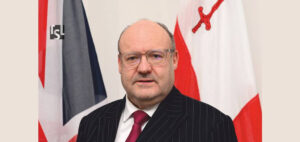Building a Greener Future!
Effective government administration serves as the key to any well-functioning society. It plays a pivotal role in ensuring the smooth operation of public services, the implementation of laws and regulations, and the protection of citizens’ rights and interests. From providing essential services like healthcare, education, and infrastructure to regulating industries and safeguarding national security, government administration touches every aspect of public life.
As societies evolve and face new challenges, the importance of innovative leadership in government agencies cannot be overstated. Within this sphere of change and adaptation, one individual stands as a shining example of determination: Chris Hinds. As a Councilperson, his unwavering commitment to advocacy resonates deeply within the bounds of societal change.
His journey, marked by personal challenges and triumphs, epitomizes the transformative power of dedicated leadership. His dedication to amplifying voices within the disability community resonates deeply, shaping policies that foster accessibility and empowerment for all.
Guided by Chris’s vision for transformative change, an innovation emerges within the Office of Denver City Council. Through his leadership, initiatives at the intersection of land use, emerging technologies, and sustainability are poised to redefine the urban governance sector, enriching a future where progress is synonymous with environmental operations and social equity.
Learn more about his role in transforming urban governance:
From Rural Roots to Influential Leadership
Chris grew up in rural Texas as the only child of a single mother. His father never graduated high school, and his mother cleaned houses as he was growing up. If anyone had told him that he would become an elected official or one of the top 10 most influential leaders, he wouldn’t have believed it.
In August 2008, the Democratic National Convention was held in Denver, and Chris lived and worked very close to the city center where the DNC events were happening. On August 26, 2008, his life changed fundamentally when he was in a motor vehicle crash, sustained a spinal cord injury, and lost his ability to walk.
Everyone is the sum of their experiences. On that day, Chris joined the disability community. It’s the only protected class that anyone can join at any time, whether they like it or not. It wasn’t an immediate transition for him, but he did stop spending so much time climbing the corporate ladder and started spending more time advocating for his new community.
He started volunteering as an advocate for the disability community, including going to city hall, the state capitol, and Washington, DC. In May 2018, the Colorado Governor signed the Chris Hinds Act into law.
It is a law that changes the way Colorado approaches parking for people with disabilities, and legislators named it after him to commemorate the years of volunteer advocacy he had for the disability community as well as the way he approaches advocacy. Legislators thanked him for researching how other cities and states approach policy, collecting and documenting that research, and presenting the findings in a concise way that educates and persuades elected officials to act.
After the Chris Hinds Act was signed into law, he thought to himself, “If they’re going to name laws after me as a private person, imagine what I could do as an elected official!” Now, he doesn’t have to imagine. He is now the first elected official in Denver’s history—local, state, or federal—who uses a wheelchair for mobility and the first elected official who identifies as a member of the disability community.
Advocacy for Accessible EV Charging Stations
Colorado and Denver offer quite a few rebates in addition to the federal rebates for electric vehicles and EV infrastructure. A few years ago, Chris thought it would be a great opportunity to purchase an electric vehicle. However, after meeting with three different EV manufacturers, all three of them recommended against purchasing an electric vehicle because there’s no regulation, local, state, or federal, regarding access to EV charging stations for people with disabilities.
Furthermore, there are still some tough conversations happening about electric vehicle charging infrastructure for condominium buildings (including potential rebates), and he lives in a condominium.
Denver made sure that the new EV charging stations installed in new parking lots in Denver were accessible to everyone, including people with disabilities. They’re pouring millions of dollars each year into creating a nationwide EV charging infrastructure, and it’s way better to install them right the first time rather than reinstall the infrastructure later once policies are put in place.
It would be unfortunate if every community, except the disability community, had access to a nationwide EV charging installation. It would also be unfortunate if, in a few years, the only people still driving combustion engines were people with disabilities, and we knew that any ICE vehicle on the road was driven by someone with a disability. All because access wasn’t provided for the disability community.
The Intersection of Land Use and EV Infrastructure
Denver is both a city and a county, so Chris happens to be a City Councilor as well as a County Commissioner. As a result, he has three major duties: legislation (they are the legislative branch, after all!), land use, and the budget. He uses each of those duties to push for everyone to adopt EVs more quickly.
They now have legislation that ensures new parking lots require EV charging stations, and for those new EV charging stations, they must be accessible to everyone, including people with disabilities. This is also a land use conversation, and he’s made some modifications to land use requirements regarding parking and EV infrastructure. As just one example, in one neighborhood in his district, the government has gotten out of the way of mandating parking minimums.
That’s already the case in two other downtown neighborhoods in his district. And they’re studying whether Denver should have parking minimums at all. It was important decades ago when the American dream was literally to get into your car on Friday night and cruise the strip, but that’s changing. In his district, a third of households in the west half of the district don’t own cars at all.
He also chairs a legislative committee in Denver called BIZ, also known as the Business, Arts, Aviation, Climate, and Workforce Services Committee. It’s such a mouthful that everyone just calls it BIZ. One of the city agencies that reports to his committee is their economic development agency.
DEDO is an acronym that translates to the Denver Economic Development and Opportunity Office. He has oversight over DEDO, and DEDO has oversight over all the economic incentives throughout the city. Some of those incentives include EV infrastructure incentives. CASR is another agency that reports to BIZ, and it also has economic incentives that encourage more EV adoption in Denver.
The Power of Collaboration in Policy Making
Collaboration is what elected officials should do! Chris believes it’s his obligation to hear from as many different perspectives before making policy decisions. In this case, it means hearing from city and state elected officials, the city (Denver Economic Development and Opportunity, or DEDO), and state (Colorado Energy Office, or CEO) agencies with oversight over electric vehicles.
Denver’s policies started with seven months of conversations at the state level with the CEO’s Colorado Electric Vehicle Coalition policy committee. These organizations include EV manufacturers, EV charging station manufacturers, community advocacy groups, governmental entities, and anyone else involved in the space.
Pioneering Policies for Emerging Technologies
Local government can lean in when the state and federal levels aren’t yet ready to create policy decisions about new topics. It’s important to remember that democracy was founded more than 225 years ago, and back then, making laws involved far fewer community members and stakeholders than they do today! Rightfully so, laws aren’t made for things that don’t exist yet.
So, when there are new, rapidly evolving technologies like the electric vehicle revolution, the local government can make value statements—like creating laws around electric vehicles—sometimes faster than the state or federal levels can. Model legislation can also be created in Denver, installed, and tested to ensure it makes the most sense with a smaller audience in Denver and then moved to the state and federal levels.
A Vision for Inclusive Progress
Chris hopes to make an impact through his leadership in EV initiatives within the Denver City Council by accelerating EV charging adoption, assuming everyone has access to that accelerator pedal (including people with disabilities).
Engaging the Community
America and Colorado have Constitutions. Interestingly, Denver’s “constitution” is called a Charter. The responsibilities of Denver’s elected officials are outlined in their Charter, and that’s where legislation, land use, and budget powers are outlined.
Constituent engagement is not one of the Charter-granted duties of the City Council. Interestingly, it’s hard to imagine how they could possibly make good decisions on legislation, land use, or budget decisions without engaging the community. So, Chris holds community meetings each week, including office hours dedicated to constituents. He is also available through social media, an e-newsletter, phone, email, a website, and web forms.
All these channels are used to connect with their approximately 85,000 constituents and their businesses. His district includes the center of the city, so they have a higher concentration of businesses and unique venues (their convention center, sports teams, college campuses, etc.), so it’s important that they include them in their conversations.
After all, they want them to put on the best events, so everyone comes to his district and gives Denver more tax dollars. They’re happy to put your money to work for their community!
Bridging Tech and Business
One of the best ways Chris can contribute is by being able to “talk technical.” He holds a Computer Science degree, so he’s always ready to discuss technology. He also has an MBA in Finance and Strategy, which helps him understand the business aspects of technology. When it comes to accessibility, he often hears the phrase “I never thought about that” when discussing accessibility topics, and that’s where he can truly add value.
A Pathway to Enhanced EV Programs
Chris’s advice for other cities or municipalities looking to enhance their EV programs and policies is to research other cities and how they are approaching electric vehicle adoption. If they’re looking for some help, he’s happy to share the research that has already been performed!
Balancing Innovation and Sustainability in the EV Revolution
Clearly, there are environmental considerations when introducing new technology to the market. In this case, EV batteries (and other parts of an electric vehicle) are new, and they may require some significant consideration. There is also a rapidly approaching cliff where it may soon become impossible to slow or stop climate change. Continuing to extract and burn fossil fuels while hoping that this cliff will never come is not a sustainable strategy.
After creating a built environment that doesn’t require private car ownership at all, policies and infrastructure can be created that don’t use fossil fuels at all. Here, fossil fuels are being removed from everyone’s equation, and work is being done with energy generation companies to move them from fossil fuel usage towards renewable energy. The focus must also be placed on the supply side so that the burning of fossil fuels is not simply transferred elsewhere.
Ensuring a Green Future for All
Chris is enjoying living on this beautiful little planet called Earth. In his view, if we want to keep Earth habitable for our kids and grandkids (and ourselves!), we must rapidly mode-shift everyone away from fossil fuel consumption and toward better alternatives.
He is looking forward to a significant, rapid mode shift for everyone, including people with disabilities.


